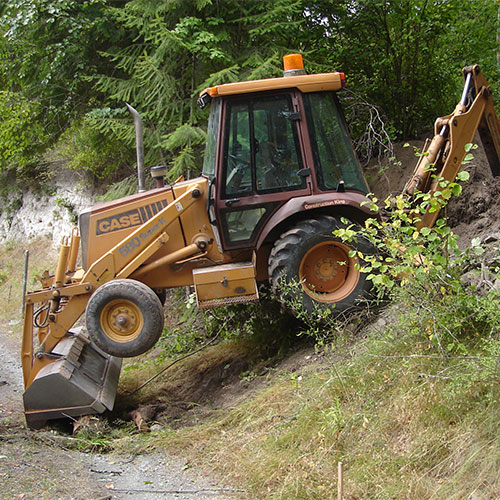Excavating Ohio - Top Excavation Professionals for Ohio Projects
Excavating Ohio - Top Excavation Professionals for Ohio Projects
Blog Article
Comprehensive Excavation Methods: Understanding the Principles for Success
In the realm of construction and civil engineering, the importance of effective excavation methods can not be overstated. The careful planning, specific implementation, and thorough focus to information required in excavation tasks demand a thorough strategy that includes various essential aspects. From first dirt evaluation to the implementation of safety and security measures and regular progress monitoring, understanding these core components is vital for achieving success in any excavation venture. The real proficiency lies not just in understanding these fundamentals but in flawlessly incorporating them to navigate the complexities of excavation projects with skill.
Comprehending Excavation Job Preparation

The preliminary phase of any excavation job is the preparation phase, where important decisions are made that can substantially impact the outcome of the task. Recognizing the job budget, extent, and timeline constraints is essential for creating a comprehensive excavation plan that guarantees the task's success.
One secret facet of excavation job planning is the growth of a comprehensive timeline that outlines the sequence of tasks, deadlines, and landmarks. This timeline serves as a roadmap for the project team, enabling them to track progression and make required changes to make sure the task remains on schedule. Additionally, a distinct budget plan that accounts for all costs, including equipment leasing, labor costs, and products, is crucial for avoiding price overruns and delays. By very carefully considering all these variables during the preparation stage, excavation tasks can be carried out successfully and successfully, leading to effective outcomes.
Soil Analysis and Site Evaluation
Carrying out thorough soil analysis and site examination is an important action in the preparation phase of any type of excavation job. Soil analysis involves identifying the make-up, structure, and buildings of the soil at the excavation site. This information is crucial for comprehending the dirt's bearing capacity, wetness material, and possibility for disintegration, which are key consider establishing the excavation approaches and tools required for the project.
Website examination goes beyond soil analysis and incorporates a broader assessment of the general website problems. This analysis includes recognizing any kind of potential dangers, such as underground energies, environmental issues, or unstable terrain, that could influence the excavation procedure. By completely evaluating the site, task supervisors can establish effective excavation approaches that prioritize safety, performance, and environmental management.
Utilizing advanced modern technologies like ground-penetrating radar, soil sampling, and drone studies can enhance the precision and performance of dirt evaluation and site examination. Spending time and resources in these preliminary steps can ultimately save time and avoid pricey hold-ups or problems during the excavation procedure.
Equipment Option and Use
Reliable excavation jobs count heavily on critical equipment choice and application to make certain optimum efficiency and efficiency. Selecting the right equipment for the work is vital in optimizing efficiency and minimizing downtime. Variables such as the kind of soil, depth of excavation, and job range play a considerable duty in determining the most ideal tools for the job handy.

Along with selecting the proper tools, appropriate utilization is essential to job success. Operators has to be educated to deal with the equipment safely and effectively - septic ohio. Normal upkeep checks and prompt repair services help avoid break downs and make certain regular performance throughout the job
Safety Procedures and Regulations Compliance
In the realm of excavation jobs, prioritizing excavating ohio safety and security steps and compliance with regulations is extremely important to ensuring a lawfully sound and safe and secure functional environment. Precaution encompass a variety of methods, consisting of conducting extensive site assessments, carrying out appropriate signs and barriers, and supplying adequate safety training for all workers entailed in the excavation procedure. Adherence to guidelines, such as OSHA demands in the United States, guarantees that the excavation project satisfies the necessary standards to safeguard employees, spectators, and the surrounding atmosphere.

Tracking Progress and Adjusting Approaches
Just how can predict managers efficiently track the advancement of excavation jobs and adapt their approaches accordingly to optimize outcomes? Monitoring progress is necessary for making certain that excavation tasks remain on track and fulfill deadlines. Project supervisors can utilize various devices and methods to track progress, such as day-to-day report card, normal site examinations, and advanced monitoring technologies like drones and GPS tracking systems. By continually checking the project's development, managers can recognize any possible delays or problems early and take aggressive measures to address them.

Conclusion
In verdict, grasping the principles of thorough excavation strategies is vital for the success of any type of project. By comprehending task planning, examining dirt and site conditions, picking proper equipment, following safety and security policies, and checking progression, project supervisors can ensure a smooth and reliable excavation procedure. Applying these approaches will certainly result in successful outcomes and decrease potential threats or problems during the excavation project.
The initial phase of any type of excavation task is the preparation phase, where vital decisions are made that can dramatically affect the outcome of the task. Recognizing the job scope, timeline, and spending plan restrictions is important for creating a comprehensive excavation strategy that ensures the task's success.
Just how can predict managers successfully track the improvement of excavation projects and adjust their techniques as necessary to enhance outcomes? By very closely checking development and being prepared to adjust strategies, project supervisors can improve the general success of excavation jobs.
By understanding project preparation, evaluating dirt and site problems, selecting ideal equipment, complying with security regulations, and checking progression, job supervisors can ensure a smooth and effective excavation process.
Report this page